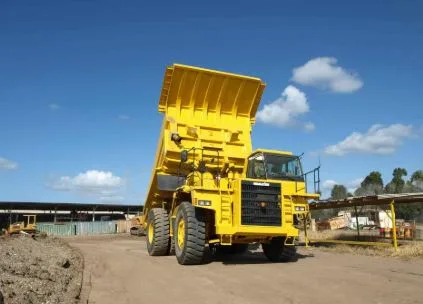The Ultimate Guide to Dump Truck Tickets: Tracking Loads, Ensuring Compliance, and Boosting Profitability
Introduction
In the world of construction and material hauling, every load counts—literally. Whether you’re moving gravel, asphalt, dirt, or debris, keeping accurate records of those loads is essential for billing, compliance, and performance tracking. That’s where dump truck tickets come into play.
More than just pieces of paper, these documents serve as proof of work, ensuring that haulers get paid for every ton moved, and contractors are billed only for the materials received. In today’s fast-paced industry, where margins are thin and accountability is critical, managing dump truck tickets effectively can make or break a job’s profitability.
This guide will walk you through everything you need to know about dump truck tickets—from what they are, how they’re used, digital transformation, and best practices for maximizing efficiency.
🛻 1. What Are Dump Truck Tickets?
Dump truck tickets are delivery records issued for each load hauled by a dump truck. They function as a receipt and tracking tool that documents critical load details.
A Typical Dump Truck Ticket Includes:
- Date and time of the haul
- Job site or customer name
- Material type (e.g., gravel, dirt, sand)
- Gross, tare, and net weights
- Load origin and destination
- Truck number or driver ID
- Signatures (loader, driver, recipient)
These tickets are generated at quarries, material yards, or loading sites and accompany the driver to the drop-off location. Upon delivery, the recipient may sign the ticket to confirm receipt, creating a clear audit trail.
📦 2. Why Dump Truck Tickets Matter
Dump truck tickets serve multiple vital purposes across every link of the hauling supply chain.
✅ 1. Billing and Invoicing
Haulers rely on tickets as proof of completed work when billing clients. Contractors use them to verify charges from both material suppliers and haulers.
✅ 2. Job Cost Tracking
Accurate ticketing helps project managers understand how much material has been delivered, how many loads have been completed, and what the associated costs are.
✅ 3. Regulatory Compliance
Weight tickets help ensure loads are within legal limits and support environmental, tax, and DOT compliance in many jurisdictions.
✅ 4. Dispute Resolution
When there are discrepancies over load quantities or billing errors, tickets serve as documented evidence to protect all parties.
✅ 5. Performance Analysis
For fleet managers, dump truck tickets can help track driver efficiency, identify slowdowns, and optimize routes and scheduling.
In short, they’re essential for accountability, transparency, and profitability.
🔄 3. The Traditional Paper Ticket System
Historically, most dump truck tickets have been handwritten or printed on multi-part carbonless forms. While this method is still widely used, it comes with several limitations:
⚠️ Issues With Paper Tickets:
- Prone to loss or damage in trucks or job sites
- Illegible handwriting or missing information
- Manual data entry for invoicing and reporting
- Delays in billing cycles due to slow ticket submission
- Limited visibility for project stakeholders in real time
Despite these drawbacks, many small to mid-sized operations still rely on paper tickets because of habit or perceived ease of use. However, the industry is quickly shifting toward digital alternatives.
📲 4. The Rise of Digital Dump Truck Tickets
In recent years, construction and logistics industries have embraced digital ticketing systems to overcome the inefficiencies of paper-based processes.
Features of Digital Ticketing Platforms:
- Mobile apps for drivers to view and sign tickets
- Real-time GPS tracking of loads
- Digital signatures at pickup and drop-off points
- Automated data syncing with billing software
- Cloud storage for instant access to records
- Camera/photo attachments for load verification
Benefits of Going Digital:
- No lost or damaged tickets
- Instant visibility for contractors, drivers, and dispatchers
- Faster billing cycles
- Improved accuracy and data validation
- Environmental savings from reduced paper use
Companies that switch to digital ticketing often see a reduction in administrative workload, fewer billing disputes, and faster payment turnarounds.
💼 5. Who Uses Dump Truck Tickets?
Dump truck tickets are essential tools for several key players across the construction and hauling ecosystem:
🚧 Contractors & Project Managers
Use tickets to confirm delivery of materials to job sites and match with invoices.
🚛 Trucking Companies & Owner-Operators
Use tickets to validate work completed and bill clients accordingly.
🪨 Material Suppliers & Quarries
Issue tickets as part of the loading process to track outgoing inventory and ensure correct delivery.
🧾 Accounting & Admin Teams
Rely on tickets to enter accurate data into billing and project costing systems.Whether you’re a one-truck operator or a large fleet serving multiple job sites, managing dump truck tickets efficiently is critical to staying organized and getting paid.
📋 6. Dump Truck Ticket Workflow: Step-by-Step
Understanding how a typical ticketing workflow unfolds helps highlight where digital improvements can streamline the process.
🛠️ Standard Workflow:
- Truck Arrives at Load Site
- The truck is weighed empty (tare weight).
- Truck Is Loaded
- Material is loaded; the truck is weighed again (gross weight).
- Ticket Is Issued
- Ticket includes net weight (gross – tare), load details, timestamps.
- Truck Delivers Load
- Tickets may be signed by the recipient as proof of delivery.
- Ticket Submitted
- The driver turns in the ticket to the dispatcher or admin team.
- Billing/Payroll
- Ticket used for invoicing and/or paying drivers.
Each ticket becomes a line item of accountability and revenue.
📈 7. Best Practices for Managing Dump Truck Tickets
🧠 Tips for Paper-Based Systems:
- Use weatherproof ticket books or envelopes to prevent damage.
- Require full driver signatures and timestamps.
- Implement a consistent submission schedule (daily or weekly).
- Train drivers on legible, complete ticket entries.
🧠 Tips for Digital Ticketing:
- Choose software compatible with your dispatch or accounting tools.
- Use GPS validation to confirm load and delivery points.
- Offer training for drivers and field personnel.
- Back up digital records regularly.
Consistency is the key—whether using paper or digital, the system must be followed by all team members to work effectively.
💡 8. Common Problems and How to Avoid Them
Even with a solid system in place, challenges can arise. Here are a few common issues and how to prevent them:
| Problem | Solution |
| Lost or damaged tickets | Use digital systems or protective ticket books |
| Incomplete information | Provide ticket templates and proper training |
| Delayed submissions | Enforce daily or per-load turn-in policies |
| Disputed load counts | Take photos at pickup/drop-off or use GPS verification |
| Data entry errors | Automate ticket syncing with billing systems |
By addressing these friction points early, companies can save hours of admin work and thousands of dollars per project.
📊 9. Integrating Dump Truck Tickets With Other Systems
The power of dump truck ticket data grows when integrated with other tools:
- Dispatch software: Automate ticket creation when jobs are assigned.
- GPS/Telematics: Sync ticket time/location with vehicle data.
- Invoicing systems: Generate invoices directly from ticket info.
- Project management platforms: Match material volumes to project budgets.
Digital ticketing not only improves individual jobs—it contributes to better forecasting, budgeting, and operational efficiency across the board.
🧾 10. Choosing a Dump Truck Ticket Solution
If you’re ready to upgrade your ticketing system, consider the following when evaluating providers:
Key Features to Look For:
- Real-time ticket access and reporting
- Mobile app compatibility (iOS and Android)
- Signature and photo capture
- Integration with accounting/distribution software
- GPS location tagging
- Custom ticket templates
- Secure cloud-based data storage
Leading platforms include features like batch exports, performance analytics, and customer portals to improve collaboration.
✅ Conclusion
Whether you haul 10 loads a week or 100 a day, managing dump truck tickets is essential to running a successful hauling operation. From verifying deliveries and getting paid to avoiding disputes and improving project visibility, accurate ticketing forms the backbone of your back-office operations.
And while traditional paper tickets still serve their purpose, the future lies in digital systems that offer real-time access, automation, and seamless integration. By modernizing your ticket workflow, you not only save time—you unlock opportunities to scale, improve transparency, and boost profits.
In a competitive industry where every load matters, your dump truck tickets should work as hard as you do.





